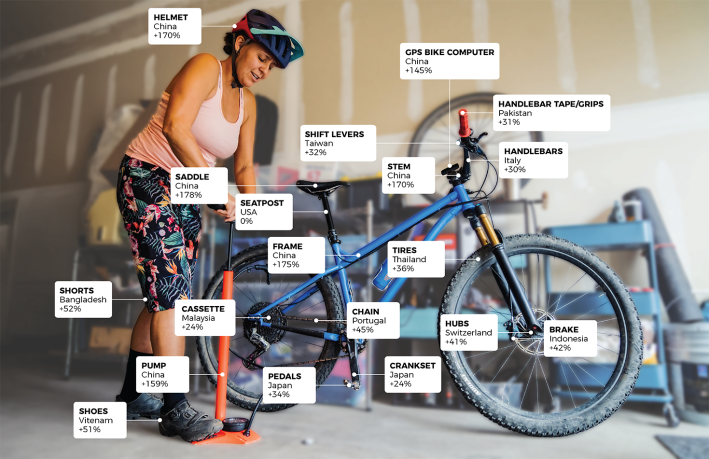The trade war with China could wipe out Americans' ability to buy bikes, bike components, and even the helmets they need to ride safely, according to the trade association representing the industry — unless President Trump gives manufacturers more time and support to bring production back on shore.
A coalition of bike companies led by the nonprofit PeopleForBikes sent the president a letter today asking him to exclude bike-related imports from his proposed tariffs on China, which they argue could still devastate an industry despite recent negotiations that have driven tariff levels down.
That's because the bike sector has been forced to depend so heavily on foreign trade over the years that around 97.8 percent of all bikes sold today are imported from abroad — with the vast majority of those shipments coming from China itself.
While "America once made all of the bicycles that we need," the group wrote, policymakers failed to fight back a flood of cheap bikes from overseas that gradually put domestic manufacturers out of business.
That decades-long cascade of policy failures forced U.S. bike companies to source most of the 200 or so parts in each vehicle from manufacturers in foreign countries, pushing the industry to its limits even before Trump sparked a trade war with their primary suppliers.
Today, even critical (and often, legally required) bicycle safety accessories like helmets are overwhelmingly produced overseas, as are necessary ones like bike pumps, and even bike shorts. On many bikes, only the seat post is reliably American-made.

That dependency means that rather than creating new American jobs as Trump intended, the threat of tariffs has U.S.-based bike companies contemplating additional layoffs and even outright closures — "including some of our few remaining domestic manufacturers" and companies that assemble bikes on U.S. soil.
"We are working with members of Congress to create an environment of domestic manufacturing, but this initiative will take many years and significant financial investments," the group wrote, likely in reference to a 2024 bill that would bolster the U.S. bike industry through tax credits and other initiatives. "In the meantime, our industry urgently needs tariff relief in order to marshal the resources needed to continue moving our supply chains, including to the United States."
Notably, the American bike industry isn't necessarily looking for all bike tariffs to be eliminated.
The Coalition actually praised Trump for closing the infamous de minimis loophole, which previously allowed foreign sellers to sell and ship bikes under $800 without paying any tariffs, collecting any sales taxes for states, or subjecting their products to critical safety inspections even on safety equipment like helmets.
That gaping loophole has proved particularly devastating in the e-bike market, whose overall reputation has been stained by the infusion of cheap, exploding batteries from overseas that are not subject to the same rigorous certification standards as imported bikes that cost more. While the specific amount of the tariff on ultra-cheap goods is still being ironed out, the Coalition is grateful that bad actors will now be forced to at least pay something.
"We appreciate your focus on China's competitive threat and are especially thankful for your leadership in closing the de minimis loophole, which has undermined the U.S. bicycle industry and local bike retailers across America for many years," the letter stated.
If Trump can finish the job of protecting the American bike industry by excluding basic components from tariffs — something they point out he already did once during his first term, the last time he tackled global trade — PeopleForBikes argues that he could protect a "quintessential American industry" and the many jobs that come with it.
And while President Trump might not agree with the importance of displacing car trips with bike trips, it might also keep U.S. residents in the saddle, especially among "price-sensitive riders" like young people, families, and low-income residents.






